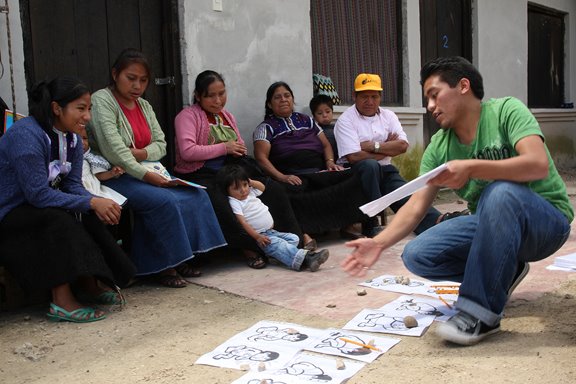Mexico: Literacy Can Save a Life
Categorized as: Stories on March 8, 2011.

A story by Suzanne Skees on literacy education in Mexico.
Partner: Freedom from Hunger’s Credit with Education program through local partner Al Sol in Chaipas, Mexico
28-year-old Luiz Fernando Mendez Ruiz grew up in Chiapas, and he knows firsthand the issues his microfinance clients face—some of Mexico’s highest rates of poverty, malnutrition, and illiteracy. He used to work as a hospital emergency nurse and then switched to teaching classes for our local microfinance partner, Al Sol. Luis felt a strong conviction that he could save more lives this way.
“Once I saw a young girl die in the hospital emergency room where I worked,” Luis says. “Her mother didn’t know how to read and write. Her father was an alcoholic and did not take interest in the family.” He shakes his head in anger. “And the girl just died. Her mother didn’t have any power to make any decisions for her. She felt really bad. She cried really hard, and didn’t know what to do because she was dependent on her husband.”
Luis teaches classes to small credit groups when they gather to repay their microloans, through Freedom from Hunger’s Credit with Education program. Slowly he teaches letters, words, and numbers that can help students advance their businesses, health, and self esteem.
Luis brings more than medical information to the health trainings. He brings respect. “It’s important for these women to value themselves first,” he notes. “Only from there can they help their families, children, and husband.”
Initially, the women tried to treat Luis with the same deference as they did the other men in their community. Lessons lasted barely half an hour, and no one spoke up. Luis persevered, leading sessions on self-confidence and gender issues. Gradually his clients asked, “Why do you treat us this way?” And then they commented that they liked it.
“They began to stay longer,” Luis recalls. “I kept inviting others to participate. The group started to change when I heard all their voices. They became more motivated, started asking questions about topics that concerned them, and always wanting to stay longer—one hour or more.”
For one recent lesson six women persisted under a heavy rainfall to pencil sentences into their workbooks. Luis began with the prompt “I have.” One student wrote, “I have a little son and I love him very much.”
Luis brings health topics, e.g., “Facing Illnesses that Attack Our Children,” into his literacy training, to identify common illnesses such as diarrhea, respiratory, eye and skin irritations from smoke. Because Luis’s family lineage comes from the Chamulan tribe, Luis speaks and teaches in local dialect Tzotzil as well as Spanish. He teaches adult reading and writing and blended modern and traditional medicine. Linking native medicine to modern treatments, he shows which ailments can be treated at home and how to advocate with the local doctor for more advanced illnesses.
His students become more vocal as they become literate. Julia used to run out of credit meetings early because she had to get home and cook dinner for her husband. Now she leaves his dinner on the table for him. “It’s important for me to go and learn to read and write,” she tells him. Wives complain to their husbands about overuse of alcohol. “You’re going to die early,” they warn. And mothers ask their children to eat a piece of fruit before enjoying a treat of candy.
These changes may seem small, but to Luis, they add up to an enormous social shift toward equality, health, and happiness. To him, literacy holds the key to it all.
SUBSCRIBE! Like what you see? Click here to subscribe to Seeds of Hope!
